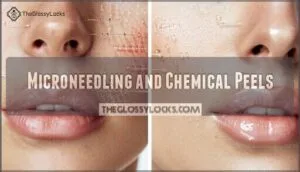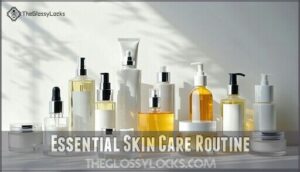This site is supported by our readers. We may earn a commission, at no cost to you, if you purchase through links.

Chemical exfoliants like AHAs and BHAs work better than harsh scrubs, while retinoids boost cell turnover for smoother skin.
Daily sunscreen prevents further texture damage, and ingredients like niacinamide help refine pores.
Professional treatments such as microneedling or chemical peels can accelerate results, but consistency with your routine matters most.
The secret lies in understanding which specific ingredients target your particular texture concerns.
Table Of Contents
- Key Takeaways
- Causes of Uneven Texture
- Improve Skin Texture
- Professional Skin Treatments
- Essential Skin Care Routine
- Maintaining Healthy Skin
- Frequently Asked Questions (FAQs)
- Can skin texture be improved?
- How to get flawless skin texture?
- How can I fix my skin texture naturally?
- How do you fix skin textures?
- Why is my skin so badly textured?
- What is the role of diet in skin texture?
- Can stress impact skin texture and appearance?
- How does sleep affect skin texture over time?
- Is textured skin a sign of underlying health issues?
- Are natural remedies effective for improving skin texture?
- Conclusion
Key Takeaways
- Start with gentle chemical exfoliation using AHAs or BHAs twice weekly to remove dead skin cells and reveal smoother texture underneath
- Add retinoids to your nighttime routine for accelerated cell turnover and collagen production that improves texture over 8-12 weeks
- Apply broad-spectrum sunscreen daily to prevent further texture damage from UV rays that break down collagen and elastin
- Consider professional treatments like microneedling or chemical peels for stubborn texture issues that topical products can’t address effectively
Causes of Uneven Texture
Your skin’s texture becomes uneven when several factors work against its natural smoothness and renewal process.
Aging breaks down collagen and elastin fibers while acne scars, sun damage, and lifestyle choices like smoking accelerate texture deterioration, leading to an overall deterioration in skin quality.
Aging and Collagen Breakdown
As you age, collagen decline becomes your skin’s primary concern.
Time becomes your enemy when collagen production drops 1% annually after age 20.
Your body’s collagen production drops substantially, while elastin loss reduces skin elasticity.
DNA repair mechanisms slow down, contributing to wrinkle formation and volume loss that creates uneven texture.
Here’s how aging affects your skin texture:
- Collagen production decreases by 1% annually after age 20
- Elastin fibers break down, causing sagging and loss of bounce
- DNA repair slows, leading to accumulated cellular damage
- Volume loss occurs as facial fat pads diminish over time
Acne Scars and Skin Picking
Severe cystic acne scars create lasting indentations that dramatically alter skin texture.
When you pick at breakouts, you’re damaging deeper skin layers and creating permanent scarring. These depressed acne scars become the most challenging texture issues to address.
Different scar types require specific professional options like skin resurfacing treatments, while consistent acne treatment prevents future damage.
Sun Damage and Environmental Factors
Beyond mere aging, UV exposure and pollution bombard your skin daily, creating free radicals that break down collagen and elastin.
Environmental damage from UV radiation accelerates texture deterioration, while pollutants penetrate deep into pores.
Antioxidants in your skincare routine combat these effects, but preventative measures like broad-spectrum sunscreen remain your strongest defense against environmental protection failures and long-term skin damage, ensuring environmental protection and preventing skin damage.
Poor Lifestyle Choices and Skin Health
Your habits can make or break your skin’s texture journey.
Smoking accelerates collagen breakdown while alcohol consumption dehydrates your skin, creating a rough, uneven surface.
Sleep deprivation disrupts cellular repair processes, and diet deficiencies rob your skin of essential nutrients.
Stress influence triggers inflammation that worsens texture issues.
Making targeted lifestyle changes—quitting smoking, moderating alcohol intake, prioritizing sleep, and managing stress—dramatically improves skin health and texture over time, leading to a better overall skin texture.
Improve Skin Texture
Now that you understand what’s causing your skin concerns, you can take action to improve texture naturally.
Start with gentle exfoliation using AHAs or BHAs twice weekly to remove dead cells and minimize pores. Apply retinol products at night for skin texture improvement and enhanced cell turnover.
Incorporate vitamin C serums for antioxidant protection and skin smoothing benefits. Focus on consistent product application techniques and proper makeup tips for scar minimization.
For enhanced collagen stimulation, consider treatments like RF microneedling options. These home remedies form the foundation of effective texture prevention before considering professional treatments.
Professional Skin Treatments
When your skin needs more intensive treatment, professional procedures can dramatically transform stubborn texture issues that topical products can’t address.
These in-office treatments work by targeting deeper skin layers to stimulate natural healing and collagen production.
Ablative and Non-Ablative Lasers
Two distinct laser treatments can transform your skin texture through different mechanisms.
Ablative lasers deliver dramatic results by removing surface layers, while non-ablative options work beneath without disrupting your skin’s surface.
These treatments can also be combined with other methods, like radio frequency microneedling, to boost collagen production.
- Ablative benefits include up to 75% wrinkle depth reduction after treatment series
- Non-ablative downtime typically ranges from 0-2 days versus 7-14 for ablative
- Laser resurfacing targets severe photoaging and prominent scars effectively
- Skin types respond differently – non-ablative safer for darker complexions
- Laser combinations maximize results when paired with complementary treatments
Microneedling and Chemical Peels
Microneedling creates controlled micro-injuries that stimulate collagen production, achieving 40-50% texture improvement after six sessions.
Microneedling depth varies based on scar severity, while chemical peels offer faster surface renewal.
Treatment combinations maximize scar reduction effectiveness. Peel downtime ranges from days to weeks depending on depth.
Dermarolling benefits include enhanced product absorption. Maintenance peels sustain skin rejuvenation results long-term.
Both treatments improve skin, and microneedling boosts collagen and elastin to provide a more comprehensive skin care approach.
Exosomes and Regenerative Therapies
Exosomes represent cutting-edge regeneration technology that naturally enhances your skin’s healing capacity.
These microscopic messengers stimulate collagen production and reduce inflammation, delivering noticeable skin texture improvements within 4-6 weeks.
When combined with microneedling or laser treatments, exosomes accelerate post-procedure recovery while amplifying long-term rejuvenation results through enhanced cell renewal mechanisms.
These vesicles facilitate cell-to-cell communication by transferring growth factors to enhance overall skin health and promote regeneration.
Fractional Ablative Laser Treatments
Fractional ablative laser treatments represent the gold standard for dramatic skin texture improvement.
These fractional lasers create controlled micro-injuries, removing damaged tissue while stimulating robust collagen production.
Treatment depth varies based on your specific concerns, with deeper penetration addressing severe scarring.
Recovery time spans 7-14 days, requiring careful aftercare, and studies show ablative laser safety profiles excel when performed by qualified practitioners, reducing future skin cancer risk by 90% while delivering unmatched texture refinement.
Essential Skin Care Routine
While professional treatments provide dramatic results, your daily skincare routine forms the foundation for smooth, healthy skin texture.
The right combination of ingredients and consistent habits can substantially improve your skin’s appearance over time, with smooth being a key characteristic of healthy skin.
Daily Sunscreen Use and Hydration
You’ll discover skin texture’s secret weapon through consistent sun protection and proper hydration methods.
Daily broad-spectrum sunscreen prevents UV damage that accelerates collagen breakdown and environmental protection shields against texture deterioration. For effective sun protection, consider using sunscreen broad spectrum.
Here’s your hydration arsenal:
- Maintain adequate water intake for cellular function
- Apply humectant-rich moisturizers to lock moisture
- Use hydrating serums with hyaluronic acid
This foundation supports ideal skin health and texture improvement through proper hydration.
Exfoliation Techniques and Frequency
Smart exfoliation methods transform rough, dull skin by removing dead skin cells that block your natural glow.
Choose chemical exfoliants like AHAs for surface renewal or BHAs for deeper pore cleaning, limiting use to 2-3 times weekly.
Explore options for buying these products to find the best fit for your skin type.
Over-exfoliation risks include irritation and barrier damage, so sensitive skin types should start slowly with gentler formulations for ideal skin texture improvement strategies.
Key Ingredients for Skin Texture
The science behind skin texture improvement centers on powerful ingredients that target cellular renewal and barrier function.
Retinoid benefits include accelerated collagen production, while AHA/BHA exfoliation dissolves dead skin cells for refinement.
Vitamin C protects against environmental damage and stimulates healing, while urea hydration plumps uneven surfaces.
Growth factors enhance skin texture enhancement through natural repair mechanisms, utilizing retinoid benefits and Vitamin C for optimal results.
Consistent Skincare and Lifestyle Changes
Building consistency in your skincare routine requires dedication, but the payoff for skin health is undeniable.
Your daily habits matter more than expensive treatments in achieving long-term results. Effective skin care habits include seasonal adjustments for maximum results.
- Hydration Importance: Drink 8 glasses of water daily for ideal skin texture
- Healthy Diet: Include antioxidant-rich foods like berries and leafy greens
- Sleep Quality: Get 7-9 hours nightly for cellular repair
- Exercise Benefits: Regular workouts boost circulation and skin glow
- Smoking Cessation: Quit smoking to prevent collagen breakdown
Maintaining Healthy Skin
You’ve already established the foundation with proper skincare routines, but maintaining long-term skin health requires consistent lifestyle choices that support your skin from within.
Your daily habits around nutrition, sleep, exercise, and stress management directly impact your skin’s ability to repair itself and maintain that smooth, healthy texture you’re working toward, which is crucial for overall skin health.
Nutrition and Antioxidant-Rich Diets
Your diet directly impacts skin texture through powerful mechanisms.
Antioxidant benefits from berries and leafy greens reduce oxidative damage by 25%, while omega-3s lower inflammation markers substantially.
Vitamin intake of C and E supports collagen synthesis and barrier function.
Proper hydration effects include 14% improved elasticity.
Anti-inflammatory foods create the foundation for healthy skin diet and ideal skin health.
Stress Management and Quality Sleep
Chronic stress wreaks havoc on your skin texture by flooding your system with stress hormones that trigger inflammation and disrupt cellular repair processes.
Sleep deprivation compounds these issues, preventing your skin from completing its nightly restoration cycle.
- Practice deep breathing or meditation to reduce cortisol levels
- Maintain 7-9 hours of quality sleep for ideal skin regeneration
- Establish consistent bedtime routines supporting mental wellbeing and healthy habits
Regular Exercise and Skin Benefits
Why wouldn’t you want better skin? Exercise pumps up circulation, delivering oxygen and nutrients to your cells.
Your sweat glands act as natural detoxifiers, flushing out toxins that can clog pores and dull your complexion. Regular workouts reduce stress hormones that trigger breakouts while building muscle tone that supports skin structure.
This powerful combination improves skin texture and overall appearance. To further enhance your skin, consider how consistent skincare matters is important for achieving better skin and understand that regular workouts and natural detoxifiers play a crucial role.
Long-Term Skin Texture Improvements
Achieving lasting skin texture improvements requires embracing a healthy lifestyle with consistent routine and preventative measures.
Your commitment to sustainable results through daily sunscreen, targeted skincare, and professional treatments creates future protection against texture degradation.
This thorough approach to skin texture optimization guarantees continuous skin texture refinement and enhancement techniques deliver meaningful, long-term improvements through consistent routine.
Frequently Asked Questions (FAQs)
Can skin texture be improved?
Yes, you can dramatically improve skin texture.
Through professional treatments like microneedling and chemical peels, plus consistent use of retinoids and exfoliating acids, you’ll see smoother, more refined skin over time.
How to get flawless skin texture?
Perfect skin texture requires consistent daily sunscreen, retinoids for cell turnover, chemical peels for exfoliation, and professional treatments like microneedling or laser resurfacing to address deeper concerns.
How can I fix my skin texture naturally?
Like tending a garden, natural skin texture improvement requires patience and consistency.
You’ll boost cell turnover with gentle exfoliation using AHAs, maintain hydration, eat antioxidant-rich foods, stay hydrated.
And protect with daily sunscreen for gradual results.
How do you fix skin textures?
You’ll fix skin texture through consistent retinoid use, regular chemical peels, and professional treatments like microneedling or laser therapy, combined with daily sunscreen and proper hydration.
Why is my skin so badly textured?
Picture your skin cells struggling like swimmers against a relentless tide.
You’re dealing with collagen breakdown from aging, sun damage accumulation, acne scarring, or poor lifestyle habits like smoking and inadequate skincare routines affecting cellular renewal.
What is the role of diet in skin texture?
Your diet directly impacts skin texture through antioxidants, vitamins, and omega-3s that support cellular repair and collagen production. Nutrient-rich foods help maintain smooth, healthy skin from within.
Can stress impact skin texture and appearance?
Yes, stress directly impacts your skin’s texture and appearance.
Chronic stress increases cortisol levels, which breaks down collagen, reduces skin barrier function, and triggers inflammation that can worsen existing texture issues.
How does sleep affect skin texture over time?
Ironically, while you’re tossing and turning at night, your skin’s working overtime to repair itself.
Poor sleep disrupts collagen production and cellular renewal, leading to rougher texture, fine lines, and dullness over time, which can be summarized as a loss of skin renewal.
Is textured skin a sign of underlying health issues?
Textured skin isn’t always a health red flag, but it can signal hormonal changes, nutrient deficiencies, or chronic conditions like diabetes that affect collagen production and healing.
Are natural remedies effective for improving skin texture?
While snake oil salesmen once peddled miracle cures, natural remedies can genuinely help improve skin texture through gentle exfoliation and hydration.
You’ll see results from honey masks, oatmeal scrubs, and consistent moisturizing with natural oils like jojoba.
Conclusion
Studies show that 90% of adults experience uneven skin texture by age 30, yet most people don’t know how to improve skin texture effectively.
Transform your complexion by combining consistent chemical exfoliation with retinoids and daily sunscreen protection.
Professional treatments like microneedling accelerate results, but your daily routine creates lasting change.
Start with gentle AHAs, add niacinamide for pore refinement, and maintain hydration. Remember, skin improvement takes patience—you’ll see significant texture changes within 8-12 weeks of consistent care.
- https://nycfacedoc.com/how-to-get-rid-of-textured-skin/
- https://hydrafacial.com/resources/Skintuition_Report_2024.pdf
- https://academic.oup.com/bjd/article/189/Supplement_1/i17/7333865
- https://pmc.ncbi.nlm.nih.gov/articles/PMC11845971/
- https://www.perfectb.com/how-to-improve-skin-texture-your-guide-to-fixing-uneven-skin-tone/









